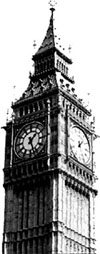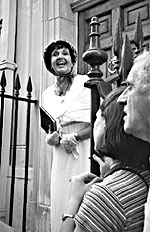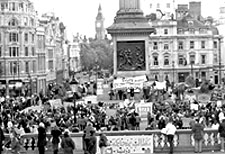Now, as I had just ridden the underground for the first time, I made my way to the light - and beheld London. Every sense was heightened as I walked along the choppy, fish-smelling River Thames. It was only when I heard Big Ben chime the hour in its gleaming golden tower that I knew I was not in Kansas (or was it Texas?) any longer. That experience was the first of many wonderful times I had studying abroad in London this past semester with the TCU London Centre program. It was a mind-expanding experience that could have only been better if I had known certain things. I pored over guidebooks and read every magazine article I could find about London beforehand, but I still was not prepared for some of the things I would face - good and bad. Therefore, I have compiled a few observations to help those studying abroad in London or just visiting the city.
Not Texas hospitality While I had stocked up on my long johns for the frigid temperatures, they did me little good when I was met with more frosty personalities than weather. No Texas hospitality here. This is especially noticeable in the stores and restaurants where there is no sense of service. No one asks if he or she can help you. No one asks if you would like a refill. And you even have to sack your own groceries. Thankfully, this seems to be a trend only in central London. The people in the outskirts and in other parts of the United Kingdom are much more friendly. Perhaps there are just so many people in central London that people do not want to bother with personal relationships because maintaining them would be next to impossible. Population revelations
According to the Multi-Ethnic Britain Web site, ethnic minorities comprise 20 percent of London's population. But London contains 50 percent of Great Britain's ethnic population. I heard more languages and dialects spoken on the streets in London than I have ever heard spoken in my life. It seems that there are no native Londoners - just a direct reflection of the world's diversity. The safeness of the city Petty thieves often have a field day with tourists, but I felt safer in London than I have ever felt in Texas. There aren't too many cities in the world where a young woman can walk down the street alone at 11 p.m. and still feel safe. (Not like I ever did this, Mom.) One of the main reasons for this level of safety is the enforcement of strict gun control laws. Not even the "bobbies" carry guns. The most exciting crime I saw was when the police caught a pickpocket in the act at the Remembrance Day service at the Cenotaph. Wanted: London tourists, claustrophobics need not apply
Everything comes in small packages, like the standard box of Ritz crackers no bigger than a granola bar box. At 5 feet 1 inch, I admit good things come in small packages, but for us Americans who are used to the concept of stocking up, it can be difficult. This may be unique to central London as well. We passed larger warehouse stores like Home Base on our travels out of the city. People in central London live in "the now." They buy whatever groceries they need for that day because they can't load 10 shopping bags into their trunk. There are few places to park in central London, so they have to be able to carry all their groceries to their home or onto the tube on foot. The history - really, really old history - of the city A do-it-yourself guide of the city is easy if you do one thing - look for the blue plaques. They are everywhere. The blue plaques are put up by the English Heritage to commemorate historical events and places. For example, we could see the "Charles Darwin Lived Here" plaque from our window, and on the way from our flat to the London Centre, a plaque tells us where the first anesthesia was performed. And everything is ancient. Old to us here in America is the 1600s, but it's easy to see things dating back to A.D. 1000. in London. If you go to a service at Westminster Abbey, you will worship where people have worshipped for a thousand years. It would have been nice to have known all this and more before I studied abroad, but part of the experience of living in a foreign country is figuring out things for yourself. So, don't just take my word for it. Learn on your own by experience.Then you come to realize your powers of independence and your ability to adjust to whatever comes your way.
Reagan Duplisea
By Kasey Feldman staff reporter TCU was ranked fourth in the nation among doctoral universities for the percentage of students who study abroad in an academic year. The study, which was conducted by the Institute for International Education and released in December, stated more than 23 percent of TCU students study abroad sometime during their academic career. Delia Pitts, director of international education, said the ranking means that TCU is first among universities in the region. The next-highest ranking university from TCU's region is the University of Tulsa at No. 7. Pitts said the availability of more information about studying abroad, as well as a rising level of interest in international study, contributed to the ranking. She said officials within the international education department launched a study-abroad page on TCU's Web site and built a resource room where students can read about study-abroad programs. Pitts said she expects TCU to improve its ranking. The current information was collected before the opening of the TCU London Centre, and more summer study-abroad programs have been added since the study. Pitts said the versatility of TCU's summer programs makes it possible to offer classes in majors that ordinarily would not give students the opportunity to study abroad. During the summer, TCU offers a social work class in Mexico, a nursing class in London and business classes in Germany and Hungary. Peggy Watson, associate professor of Spanish, said professors enjoy leading the classes because of the freedom they are given to form nontraditional interdisciplinary studies combinations, such as the program in Scotland which combines geology, psychology and design classes. "TCU is really receptive to different ways of doing study abroad," Watson said. "As long as it is a valid idea that will appeal to students, TCU is open to any way professors want to do programs." Watson has led students on summer courses in Mexico and plans to take a group to Spain this summer. The study was conducted during the 1997-98 academic year and printed in Open Doors, the Institute for International Education's collection of statistical information, which is published every two years. On the list of doctoral universities, Dartmouth College ranked first, Wake Forest second, and Miami of Ohio University third.
Kasey Feldman |
| The TCU Daily Skiff © 1998, 1999 Credits |
 Like a groundhog coming out of its winter burrow and seeing
the sun for the first time in months, I emerged from the Embankment tube
station and really saw London for the first time. I had been in England's
capital for three days, but most of that time was spent in a state of disoriented,
jet-lagged euphoria.
Like a groundhog coming out of its winter burrow and seeing
the sun for the first time in months, I emerged from the Embankment tube
station and really saw London for the first time. I had been in England's
capital for three days, but most of that time was spent in a state of disoriented,
jet-lagged euphoria. Walking down Tottenham Court Road, one does not see a sea
of white pasty faces. Central London is home to many ethnic groups: Indians,
Pakistanis, Asians and Africans.
Walking down Tottenham Court Road, one does not see a sea
of white pasty faces. Central London is home to many ethnic groups: Indians,
Pakistanis, Asians and Africans. London is compact. Out of necessity, the
city quickly rebuilt itself after many fires destroyed the city. However,
everything was rebuilt on its old foundations, without any regard for developments
in modern transportation or population growth. As a result, most buildings
are tall and narrow, with very small rooms. Most grocery stores do not
even have shopping carts because the aisles are far too narrow.
London is compact. Out of necessity, the
city quickly rebuilt itself after many fires destroyed the city. However,
everything was rebuilt on its old foundations, without any regard for developments
in modern transportation or population growth. As a result, most buildings
are tall and narrow, with very small rooms. Most grocery stores do not
even have shopping carts because the aisles are far too narrow.